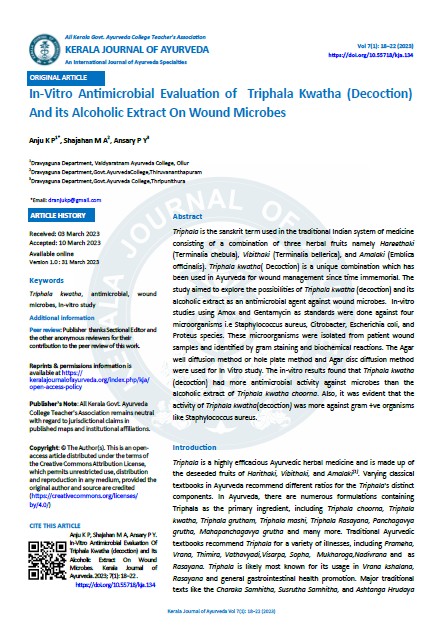In-Vitro Antimicrobial Evaluation of Triphala Kwatha (Decoction) And its Alcoholic Extract On Wound Microbes
DOI:
https://doi.org/10.55718/kja.134Keywords:
Triphala kwatha, antimicrobial, wound microbes, In-vitro studyAbstract
Triphala is the sanskrit term used in the traditional Indian system of medicine consisting of a combination of three herbal fruits namely Hareethaki (Terminalia chebula), Vibithaki (Terminalia bellerica), and Amalaki (Emblica officinalis). Triphala kwatha( Decoction) is a unique combination which has been used in Ayurveda for wound management since time immemorial. The study aimed to explore the possibilities of Triphala kwatha (decoction) and its alcoholic extract as an antimicrobial agent against wound microbes. In-vitro studies using Amox and Gentamycin as standards were done against four microorganisms i.e Staphylococcus aureus, Citrobacter, Escherichia coli, and Proteus species. These microorganisms were isolated from patient wound samples and identified by gram staining and biochemical reactions. The Agar well diffusion method or hole plate method and Agar disc diffusion method were used for In Vitro study. The in-vitro results found that Triphala kwatha(decoction) had more antimicrobial activity against microbes than the alcoholic extract of Triphala kwatha choorna. Also, it was evident that the activity of Triphala kwatha(decoction) was more against gram +ve organisms like Staphylococcus aureus.
References
Chunekar K.C, Bhavaprakasam , Chowkamba Bharathi Academy,Varanasi ,2006 , 1st varga ,page 43
The Ayurvedic Formulary of India; Govt. of India 1976, Part 2 , Page 71
Puca V, Marulli RZ, Grande R, Vitale I, Niro A, Molinaro G, Prezioso S, Muraro R, Di Giovanni P. Microbial Species Isolated from Infected Wounds and Antimicrobial Resistance Analysis: Data Emerging from a Three-Years Retrospective Study. Antibiotics (Basel). 2021 Sep 24;10(10):1162. doi: 10.3390/antibiotics10101162. PMID: 34680743; PMCID: PMC8532735
Pandit sarngadaraacharya , Sarngadara samhitha, Chowkamba orientalia ,Varanasi , chapter 2 , page 177
Balouiri M, Sadiki M, Ibnsouda SK. Methods for in vitro evaluating antimicrobial activity: A review. J Pharm Anal. 2016 Apr;6(2):71-79. doi: 10.1016/j.jpha.2015.11.005. Epub 2015 Dec 2. PMID: 29403965; PMCID: PMC5762448
Vaidya Jadvji Trikamji Acharya, Susrutha Samhita Chikitsa sthanam , Chowkamba Krishnadas Academy ,Varanasi , 2004, chapter 1/ sloka 8
Dhivya, L. S., Haritha, M., Anjana, G. V., & Priya, D. (2022). In Silico Screening of Triphala Churna against Bacterial Agents. Journal of Natural Remedies, 22(2), 221–232. https://doi.org/10.18311/jnr/2022/28664
Kurhekar, Jaya. (2016). TANNINS – antimicrobial CHEMICAL COMPONENTS. International Journal of Technology and Science, 5-9. IX. 5-9.
Pandit Hriprasad Tripathi, Hareetha Samhitha, Thrithiya sthanam, Chowkamba Krishnadas Academy ,Varanasi, chapter 1/sloka 50





